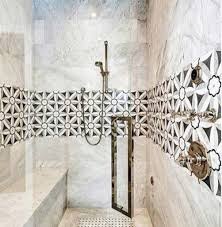When it comes to small bathroom design, making the most of limited space is key. Every choice, from the layout to the finishes, plays a role in how the room feels. One versatile and timeless option for small bathrooms is mosaic tile. Known for its intricate patterns, vibrant colors, and adaptability, mosaic tile can completely transform a small space, adding both style and functionality.
In this blog, we’ll explore the benefits of using mosaic tiles in small bathrooms and why they are a smart choice for homeowners looking to create a unique, eye-catching space. While installing mosaic tiles requires careful planning and precision, the end result can be stunning, and the following insights will help you understand the value that mosaic tiles bring to your bathroom design.
What Are Mosaic Tiles?
Mosaic tiles are small tiles, typically less than 2 inches in size, arranged in patterns on a mesh backing for easy installation. They are available in a variety of materials, including glass, ceramic, porcelain, stone, and even metal, giving homeowners a broad range of design options. The small size of the tiles allows them to be arranged in intricate patterns or to cover irregular surfaces that would be challenging with larger tiles.
The Benefits of Mosaic Tiles in Small Bathrooms
1. Visually Expand the Space
One of the main benefits of mosaic tiles in a small bathroom is their ability to make the space feel larger. Small bathrooms often suffer from a cramped or confined feel, but the strategic use of mosaic tiles can help open up the room and create a sense of spaciousness.
- Continuous Patterns: When installed across walls or floors, mosaic tiles create continuous, uninterrupted patterns that draw the eye across the space. This reduces the feeling of visual clutter and gives the illusion of more room.
- Reflective Surfaces: Mosaic tiles, particularly those made of glass or polished materials, reflect light, helping to brighten up the room and make it feel airier. This can be especially helpful in small bathrooms with limited natural light.
By using mosaic tiles to create flow and cohesion, small bathrooms can appear less segmented and more expansive, even if the square footage is limited.
2. Unlimited Design Possibilities
One of the most appealing aspects of mosaic tiles is the endless variety of colors, materials, and patterns available. Whether you’re aiming for a bold, artistic statement or a subtle, soothing design, mosaic tiles offer flexibility that few other materials can match.
- Customizable Patterns: Mosaic tiles can be used to create unique designs, ranging from simple geometric shapes to intricate, personalized artwork. This allows homeowners to infuse their bathroom with their own style and personality.
- Color and Texture Variety: With options like glass mosaics, natural stone, or metallic finishes, mosaic tiles can add depth and texture to small bathrooms. These textures create contrast and visual interest, making the space feel more dynamic.
- Accents and Borders: Mosaic tiles are perfect for accent walls, backsplashes, or borders. Using mosaics as an accent in an otherwise neutral bathroom can create a focal point without overwhelming the small space.
This level of customization makes mosaic tiles an ideal choice for those who want a small bathroom that is both functional and beautifully designed.
3. Perfect for Curved or Irregular Surfaces
Many small bathrooms have features like curved shower walls, alcoves, or other irregular surfaces that can be challenging to tile with larger tiles. Mosaic tiles, thanks to their small size and flexible mesh backing, can be easily adapted to fit these shapes, ensuring a seamless, tailored look.
- Adapts to Curves: Mosaics can be used on curved walls, floors, or even vanities without the need for excessive tile cutting. The small size of each tile allows for more precision and less waste compared to larger tiles.
- Detail Work: In areas like niches, shower benches, or around plumbing fixtures, mosaic tiles allow for intricate detail work that larger tiles simply can’t achieve. They can wrap around these features smoothly, maintaining the integrity of the design.
This adaptability makes mosaic tiles particularly useful in small bathrooms, where every inch of space counts, and fitting tile into awkward spots is often necessary.
4. Durability and Water Resistance
Bathrooms, particularly small ones, are prone to moisture and humidity, which can cause problems if the materials used aren’t up to the task. Mosaic tiles, especially those made of durable materials like porcelain or glass, are highly resistant to water, making them an excellent choice for wet areas like showers or backsplashes.
- Waterproof Options: Glass mosaics, in particular, are non-porous and impervious to water, making them ideal for use in shower enclosures, on floors, or as a backsplash behind sinks where splashes are common.
- Easy Maintenance: Mosaic tiles are generally easy to clean and maintain. Because of their small size and the grout lines between them, they provide good slip resistance in wet areas like bathroom floors.
Choosing the right material for your mosaic tiles can ensure they hold up well in high-moisture environments, providing a long-lasting, low-maintenance solution for your small bathroom.
5. Maximizing Focal Points
In a small bathroom, creating a focal point can help elevate the space, giving it a polished, thoughtful feel. Mosaic tiles are ideal for this purpose, as they naturally draw attention with their intricate patterns and vibrant colors.
- Shower Walls and Floors: A mosaic tile feature in the shower—whether on the back wall, the floor, or even as an accent stripe—can serve as a stunning focal point. The mosaic’s texture and sheen add depth, making the shower feel luxurious and spa-like, even in a compact space.
- Vanity Backsplash: Installing a mosaic tile backsplash behind the vanity creates a beautiful contrast with the sink and mirror, framing these features and making the bathroom feel more designed and cohesive.
Mosaic tiles offer the ability to create stunning focal points that enhance the visual appeal of the bathroom without overwhelming the space.
Important Considerations When Using Mosaic Tiles in Small Bathrooms
While mosaic tiles offer many benefits, there are a few key factors to keep in mind before committing to them in your small bathroom project.
1. Grout Lines
Because mosaic tiles are small, there are naturally more grout lines than with larger tiles. While this can add texture and interest to the design, it also means more grout to maintain over time.
- Grout Color Matters: Choosing the right grout color is essential. A contrasting grout color can make the mosaic pattern stand out more, while a matching grout color can create a smoother, more continuous look. Keep in mind that light-colored grout is more prone to staining and will require regular cleaning or sealing.
- Maintenance: The additional grout lines may require more upkeep than a standard tile installation. However, high-quality grout and proper sealing can minimize maintenance.
2. Precision in Installation
The small size of mosaic tiles means that precision is critical to achieve a flawless look. Small misalignments can quickly become noticeable, especially when creating intricate patterns. Additionally, ensuring that the tiles are evenly spaced and that the grout lines are consistent is crucial for a polished finish.
- Substrate Preparation: The surface beneath the mosaic tiles needs to be perfectly smooth and level, as any imperfections will be more noticeable with small tiles. Proper substrate preparation is essential to ensure a lasting and high-quality installation.
- Cutting and Placing Tiles: Cutting mosaic tiles to fit into small or irregular spaces can be tricky. Even a small mistake can disrupt the pattern and affect the overall look of the bathroom.
Given the need for precision, mosaic tile installation can be a complex process that requires a high level of skill and attention to detail.
Conclusion: Is Mosaic Tile Right for Your Small Bathroom?
Mosaic tiles are a fantastic choice for small bathrooms, offering a combination of style, versatility, and durability. They can help visually expand the space, provide endless design options, and handle the challenges of curved or irregular surfaces with ease. When installed correctly, mosaic tiles can add both beauty and function to your bathroom, making the space feel more luxurious and personalized.
However, the intricacy involved in working with mosaic tiles requires careful planning and precise execution. From selecting the right material and color to ensuring that the tiles are laid evenly and the grout is properly maintained, there’s a lot to consider. With the right approach, though, mosaic tiles can turn a small bathroom into a stunning, unique space that feels far larger than it is.


